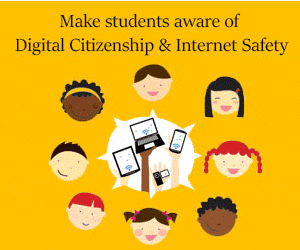👩🏻💻Digital Citizenship
Digital Citizenship
Digital Citizenship refers to the ability to engage positively, critically and competently in the digital environment, drawing on the skills of effective communication and creation, to practice forms of social participation that are respectful of human rights and dignity through the responsible use of technology.
In another word it is also known as digital footprints which are the ability to engage positivity, critically and competently in the digital environment. It is the practice forms of social participation that are respectful human rights of dignity through the responsible use of technology. Being a digital citizenship is very essential as it enables or describes how we should act when using digital tools while interacting and communicating with others through online with an appropriate, responsible and empowered way of using technology. Having Digital Citizenship Skills ensures us to use appropriate and responsible behavior when using technology and it addresses with the 21st century skills. While coming to the process of teaching and learning it helps students to learn, communicate and collaborate safely and responsibly by preventing from cyber bullying.
Characteristics of Good Digital Citizenship are comprises of 3-C (Constructive, Contributory, Citizens). Under this, it includes; protecting our private information for the security purposes, browsing safe and appropriate information while we are online, respecting self and others when we are online and having positive and respectful communication while communicating through online, acknowledging others work and respecting copyright issue and intellectual property, having fair with the online technology where by standing up to say ‘NO’ to cyber bullying and then using digital devices appropriately to browse sensible information wisely in a right time.
There are nine important elements of digital citizenship:
1. Digital Access: Every individual have right to access information where there will be equity to all the students. But we have to be aware that not everyone has the same opportunities when it comes to technology resources as some are digital immigrant, digital native and digital device.2. Digital Commerce: It includes buying and selling of items through online and here the users should be aware of dangerous and benefits of online buying and selling. Digital citizenship need to learn how to be effective consumers in a new digital economy.
3. Digital Communication: It refers to sharing information, expressing thoughts and managing relationship online and it also the involvement of electronic exchange of information.
4. Digital Literacy: It’s important to know about the various technologies and then knowing how to use it to access legitimacy of web resources.
5. Digital Etiquette: It is an ethical right in online which talks about the Do’s and don’ts in online.
6. Digital Law: It involves the electronic responsibility for actions and deeds by understanding how to use and share digital content legally and how to respect ownership.
7. Digital Rights and Responsibilities: It involves every individual freedom of rights to voice-out while using electronic devices online.
8. Digital Health and wellness: It describes the physical and psychological impacts while using technology.
9. Digital Security: It is important to protect our information from the outside forces that might cause disruption harm.





Comments
Post a Comment